The following was published for a symposium sponsored by the Center of the American Experiment, titled What Governmental Services and Benefits Are You Personally Willing to Give Up?
---------------
In May 1831, Alexis de Tocqueville and Gustave de Beaumont arrived in New York City to begin a study of the American prison system, and they used the opportunity as a pretext to explore American society itself. One of the results of their tour and study was the publication in two volumes (1835 and 1840) of Tocqueville’s monumental Democracy in America, in which he traced the development of free societies, and of America in particular, where the “law of equal liberty” is protected. He marveled at how Americans, unhampered by the political restraints so pervasive in Europe, were able to come together to innovate, associate, and create enterprises and private community organizations to address most every civil need and concern, from welfare to crime to housing to food to education to energy to the arts and more.As the book The Voluntary City vividly shows, in a free society individuals are able to make and be responsible for their own choices regarding education, enterprise, associations, media, welfare, travel, religion, safety, and the consumption of goods and services. This natural-law insight that all individuals have rights to liberty has been eclipsed by a “progressive” (i.e., authoritarian) culture of centralized government power. As a result, the areas in which Americans can be free have been significantly diminished, with government mandates replacing individual initiative.
As a classical liberal, Tocqueville prophetically discussed the problem of runaway democratic government in which a “tyranny of the majority” can vote to overrule the property rights of the citizenry, destroying the freedom that undergirds the dynamic and responsive processes of private enterprise and private civil institutions. Such a situation looms large in America today as government restrictions, surveillance, prohibitions, and taxes significantly curtail choices in virtually all aspects of life.
What, then, is to be done, short of wholesale reductions of such power and spending? What would we cut? In my case, the choice is a difficult one, not because I cannot find such a candidate, but because there are so many. Surely, entitlements, farm subsidies, bailouts, and pork of all kinds are superb candidates—even those that benefit me directly.
However, if pressed on the matter, my top preference would be the wars that the United States is conducting in Iraq, Afghanistan, Libya, and Pakistan. The current annual costs of these unconstitutional military adventures are estimated by the Congressional Research Service to be $169 billion, or about 4.4 percent of total federal spending. As a result, ending these interventions could be a much-needed step to reduce the U.S. annual deficit, save countless lives and injuries, and restore America as a beacon of liberty and justice.
The advantages of such a move go far deeper. As Independent Institute Senior Fellow Robert Higgs has shown in his pioneering book, Crisis and Leviathan, war crises have always been the most efficient engine to generate big government in every area, including entitlements, regulation, taxes, and so on. Indeed, Higgs shows that virtually every single program of federal spending and power originated during a war crisis, setting precedents that have endured and ratcheted us into the contemporary U.S. Leviathan. As a result, it is a fool’s errand to seek to reduce the welfare state or eliminate farm subsidies as long as invasive wars are pursued unchecked. This lesson was one of which, despite other differences, America’s Founders were especially mindful:
Of all the enemies of public liberty, war is perhaps the most to be dreaded, because it comprises and develops the germ of every other. War is the parent of armies. From these proceed debts and taxes. And armies, debts and taxes are the known instruments for bringing the many under the dominion of the few... No nation could preserve its freedom in the midst of continual warfare. —James MadisonChoosing now to extricate the military from Mideast conflicts would be a major step toward reducing the enormous financial crisis facing the United States and ratcheting Leviathan down. The vibrant blessings of liberty in America that Tocqueville discovered and chronicled so well can be restored only when America’s invasive wars are ended.
Unlike those nations whose rulers use their country’s resources to seek conquests, to carry on warring contests with one another, and consequently plunge their people into debt and devastation, free societies are organized for the happiness and prosperity of their people, and this is best pursued in a state of peace. —Thomas Jefferson
Safety from external danger is the most powerful director of national conduct. Even the ardent love of liberty will after a time, give way to its dictates. The violent destruction of life and property incident to war, the continual effort and alarm attendant on a state of continual danger, will compel nations the most attached to liberty to resort for repose and security to institutions which have a tendency to destroy their civil and political rights. To be more safe, they at length become willing to run the risk of being less free. —Alexander Hamilton







